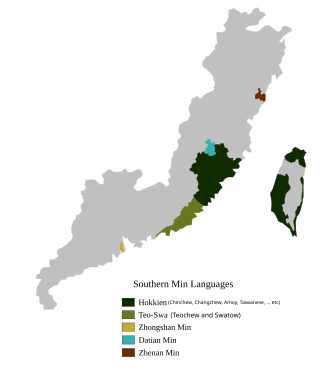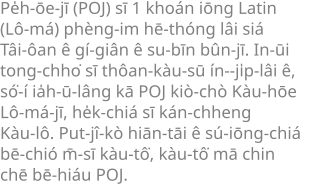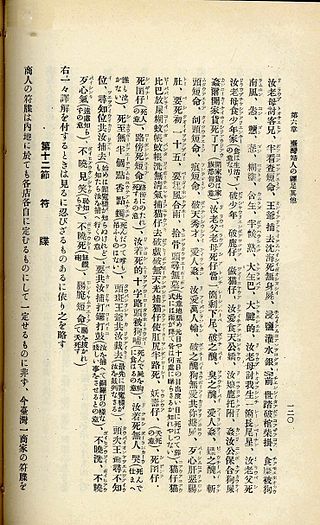Manglish is an informal form of Malaysian English with features of an English-based creole principally used in Malaysia. It is heavily influenced by the main languages of the country, Malay, Chinese languages, and Tamil. It is not one of the official languages spoken in Malaysia.
Singapore English is the set of varieties of the English language native to Singapore. In Singapore, English is spoken in two main forms: Singaporean Standard English, which is indistinguishable grammatically from British English, and Singaporean Colloquial English, which is better known as Singlish.
Kiasu is a term derived from the Hokkien “kia” meaning afraid and “su” meaning to lose. It is commonly defined as “the fear of losing,” and is directed at a person who behaves competitively to either attain their goal or to get ahead of others. The term has been part of the Singlish lexicon spoken in Singapore since the 1980s.

Teochew, also known as Teo-Swa, is a Southern Min language spoken by the Teochew people in the Chaoshan region of eastern Guangdong and by their diaspora around the world. It is sometimes referred to as Chiuchow, its Cantonese rendering, due to English romanization by colonial officials and explorers. It is closely related to Hokkien, as it shares some cognates and phonology with Hokkien.

The Hoanya are a Taiwanese Aboriginal people who live primarily in Changhua County, Chiayi City, Nantou County, and near Tainan City.

A kopitiam or kopi tiam is a type of coffee shop mostly found in parts of Indonesia, Malaysia, Singapore, Brunei and Southern Thailand patronised for meals and beverages, and traditionally operated by the Chinese community of these countries. The word kopi is an Indonesian and Malay term for coffee and tiam is the Hokkien/Hakka term for shop. Traditional kopitiam menus typically feature simple offerings: a variety of foods based on egg, toast, kaya, plus coffee, tea, Horlicks and Milo. Modern kopitiams typically feature multiple food stalls that offer a wider range of foods.
Some numbers are believed by some to be auspicious or lucky or inauspicious or unlucky based on the Chinese word that the number sounds similar to. The numbers 6 and 8 are widely considered to be lucky, while 4 is considered unlucky. These traditions are not unique to Chinese culture, with other countries with a history of Han characters also having similar beliefs stemming from these concepts.

Ang mo or ang moh is a descriptor used to refer to white people. It is used mainly in Malaysia and Singapore, and sometimes in Thailand and Taiwan. It literally means "red-haired" and originates from Hokkien, a variety of Southern Min.

Pe̍h-ōe-jī, sometimes known as Church Romanization, is an orthography used to write variants of Hokkien Southern Min, particularly Taiwanese and Amoy Hokkien, and it is widely employed as one of the writing systems for Southern Min. During its peak, it had hundreds of thousands of readers.

Tetraphobia is the practice of avoiding instances of the digit 4. It is a superstition most common in East Asian nations and is associated with death.
The term "先生", read sensei in Japanese, hsien sheng/xiansheng in Chinese, seonsaeng in Korean, and tiên sinh in Vietnamese, is an honorific used in the Sinosphere. The term literally means "person born before another" or "one who comes before". In general usage, it is used, with proper form, after a person's name and means "teacher". The word is also used as a title to refer to or address other professionals or people of authority, such as clergy, accountants, lawyers, physicians and politicians or to show respect to someone who has achieved a certain level of mastery in an art form or some other skill, e.g., accomplished novelists, musicians, artists and martial artists.

Profanity in Mandarin Chinese most commonly involves sexual references and scorn of the object's ancestors, especially their mother. Other Mandarin insults accuse people of not being human. Compared to English, scatological and blasphemous references are less often used. In this article, unless otherwise noted, the traditional character will follow its simplified form if it is different.

The languages of Singapore are English, Chinese, Malay and Tamil, with the lingua franca between Singaporeans being English, the de facto main language. Singaporeans often speak Singlish among themselves, an English creole arising from centuries of contact between Singapore's internationalised society and its legacy of being a British colony. Linguists formally define it as Singapore Colloquial English. A multitude of other languages are also used in Singapore. They consist of several varieties of languages under the families of the Austronesian, Dravidian, Indo-European and Sino-Tibetan languages. The Constitution of Singapore states that the national language of Singapore is Malay. This plays a symbolic role, as Malays are constitutionally recognised as the indigenous peoples of Singapore, and it is the government's duty to protect their language and heritage.
Singlish is the English-based creole or patois spoken colloquially in Singapore. English is one of Singapore's official languages, along with Malay, Mandarin, and Tamil. Although English is the lexifier language, Singlish has its unique slang and syntax, which are more pronounced in informal speech. It is usually a mixture of English, Hokkien, Cantonese, Malay, and Tamil, and sometimes other Chinese languages like Teochew, Hainanese, Hakka, Hockchew, and Mandarin. For example, pek chek means to be annoyed or frustrated, and originates from Singaporean Hokkien 迫促. It is used in casual contexts between Singaporeans, but is avoided in formal events when certain Singlish phrases may be considered unedifying. Singapore English can be broken into two subcategories: Standard Singapore English (SSE) and Colloquial Singapore English (CSE) or Singlish as many locals call it. The relationship between SSE and Singlish is viewed as a diglossia, in which SSE is restricted to be used in situations of formality where Singlish/CSE is used in most other circumstances.
Singaporean Hokkien is a local variety of the Hokkien language spoken natively in Singapore. Within Chinese linguistic academic circles, this dialect is known as Singaporean Ban-lam Gu. It bears similarities with the Amoy spoken in Amoy, now better known as Xiamen, as well as Taiwanese Hokkien which is spoken in Taiwan.

Hokkien is a variety of the Southern Min languages, native to and originating from the Minnan region, in the southeastern part of Fujian in southeastern mainland China. It is also referred to as Quanzhang, from the first characters of the urban centers of Quanzhou and Zhangzhou.

Singlish ; formally known as Colloquial Singaporean English, is an English-based creole language originating in Singapore. Singlish arose out of a situation of prolonged language contact between speakers of many different Asian languages in Singapore, such as Malay, Cantonese, Hokkien, Mandarin, Teochew, and Tamil. The term Singlish refers to a blend of Singaporean slang and English and was first recorded in the early 1970s.
Huan-a is a Hokkien-language term used by Hokkien speakers in multiple countries, namely mainland China, Taiwan, Singapore, Malaysia, Philippines, Indonesia, etc. The word itself when dissected means 番; hoan; 'foreign', + 仔; á; 'diminutive noun suffix', but to the ethnic Chinese that settled overseas in Taiwan and Maritime Southeast Asia, it soon came to refer to the indigenous peoples (natives) in the lands where ethnic Chinese are historical immigrants.

Hokkien is one of the largest Chinese language groups worldwide. Profanity in Hokkien most commonly involves sexual references and scorn of the object's ancestors, especially their mother. The mentioning of sexual organs is frequently used in Hokkien profanity.
Chinese Internet slang refers to various kinds of Internet slang used by people on the Chinese Internet. It is often coined in response to events, the influence of the mass media and foreign culture, and the desires of users to simplify and update the Chinese language. Slang that first appears on the Internet is often adopted to become current in everyday life. It includes content relating to all aspects of social life, mass media, economic, and political topics and the like. Internet slang is arguably the fastest-changing aspect of the language, created by a number of different influences—technology, mass media and foreign culture amongst others.









